Mahler: Lieder (Bernstein)
Introduction
Mahler's style of song writing was a natural progression from the German lieder written by Schubert, Schumann, Brahms, Wolf, and many others. The difference however, was that following the initial composition for piano and voice, Mahler continued by orchestrating the songs using colours that only a symphony orchestra can create, yet Mahler's sense of colour was completely new, despite the music remaining fully grounded in 19th century tonality.
Much of the music within the earlier songs presented on this disc found its way into the 9 and a bit symphonies that were to dominate his life, yet four of those were actually completed (bar multiple revisions) before the final set, Kindertotenlieder.
In fact, Mahler wasn't a particularly prolific composer compared to others before and since, yet his influence on the European music scene, in the twentieth century and beyond is inestimable. He saw the beginnings of the Second Viennese School, in which accepted methods of composition and tonality were completely rewritten, and was respected so highly by the major protagonists in that group that they quite readily made their own arrangements of his work. His influence has even reached out into the world of orchestral film music, with luminaries such as John Williams, Hans Zimmer and John Barry (and many more) basing much of their own work on Mahlerian orchestration, rhythmic 'peculiarities' and often frighteningly similar melodic ideas.
Here, another great composer, Leonard Bernstein has been recorded (in his later years) conducting music with which he had a particular affinity, and not just because of the Jewish connection. Bernstein was attracted to Mahler's sense of spirituality, without being particularly religious. His acute sense of 'extremes' within music were attractive, and matched Bernstein's own, sometimes extreme, musical interpretations which were not necessarily so successful in other works (the fascinating, yet ultimately disastrous Enigma Variations with the BBC Symphony Orchestra being a case in point).
Audio and Visual
The original recordings were made in stereo, and this is quite acceptable on the DVD, yet the 'DTS' track (created using specialist conversion technology called AMSI II) is also rather good, and helps clear up some of the slightly 'congested' sounds which are more noticable in the dry acoustic of the hall in Tel Aviv.
Picture-wise, it's fairly obvious that we are watching video stock from the early 80s, and the colours and glare from the lights can become a little irritating, but this isn't really why DVDs such as this are bought, and so any problems can be tolerated.
Extras
None to speak of, although the booklet's fairly honest 2-page description of the performances seen here, and some 'insider information' on the performers is quite entertaining.
Apart from this, there are some short promos for other Deutsche Grammophon DVDs, including La Traviata, and the complete Mahler symphonies (also conducted by Bernstein), which I hope to get to review some time soon.
Conclusion
Mahler's song cycles, and indeed his music in general, were treated with some disdain in the years following his death, yet recordings by Bruno Walter (his old friend) and indeed Bernstein, helped to restore them to the public's attention. Even then, live performances of the sysmphonies were few and far between, most likely because of the length of many of the works, and almost certainly because of the expense of booking everyone that would have been needed to play.
Since the 60s however, more enlightened conductors, and audiences who were quite willing to open their ears have meant his music is now at the forefront of many a programme, and it's rare to have a major orchestral season without any Mahler whatsoever.
Bernstein's own interpretations changed rather dramatically over the years. Since his more youthful enjoyment of being a composer recreating the music of a fellow composer, he seems to dwell on a few too many of the 'extremes' I mentioned earlier, and in one of the brief extracts in the extras, he admits that he feels that he is 'recomposing' Mahler's own work when conducting.
This is a valid argument of course, as the score from which the conductor reads, and from which the orchestral parts are created is not the music in itself. It is nothing without someone directing it, and without performers doing whatever is instructed. Mahler's instructions however are famous in that they are particularly detailed already, whether in dynamic contrasts or even the slightest of speedings-up or slowing-downs, and are all are described in often quite verbose ways.
Bernstein tends to overdo his extremes , and so is often in danger of preventing the music speaking for itself.
Having said this, there's still something very special in watching him take command of the music, with his obvious love for the two orchestras who play here. The Vienna Philharmonic's sound is legendary, and they are on top form in the three cycles they play in, and with Humphrey Burton's excellent (if possibly a little over-reverent) direction heading straight for those who matter, we feel as if we're a little more involved.
Thomas Hampson is also involved, being the soloist for the three cycles, yet there's something a bit aloof about everything he does. This may be a result of his posture and deliberation in getting absolutely every single german syllable correct, or he could have been trying his best to 'last out' some of Bernstein's mesmerisingly slow tempi.
Either way, his lyrical voice, and skill in producing as much dynamic effect as the whole orchestra behind him, make these performances rather special, and the final song of Kindertotenlieder is, as should be expected considering Mahler's subsequent experiences with the death of his daughter at the age of four, suitably moving.
The most infuriating performance, yet probably most satisfying overall, is of the Wunderhorn songs.
Here, Bernstein is conducting the Israel Philharmonic, an orchestra which he first conducted in 1947, 11 years after its creation, and which was originally formed to employ Jewish musicians who were being dismissed from European orchestras of the time.
The infuriating nature of the recording is threefold.
1) The quality of the orchestral playing is just not as good as it should be, yet still grabs your attention as there's no doubt about the commitment.
2) The audience surrounds the orchestra, and so the amount of fidgeting and extraneous movement in the choir stalls when the camera is focussing on the soloists is increadibly off-putting.
3) I have no idea who Walton Groenroos is, or indeed was.
Groenroos is described in the DVD booklet as "the comparatively short-lived Finnish baritone". Not enough information for this reviewer, yet any form of Googling or checking with friends came up with very little else. It seems this is/was the biggest gig of his life, but with not even a Wikipedia article to his name, I'm still at a loss.
Admittedly, his style of singing isn't the most persuasive I've come across. He gives little idea of communicating a story to an audience, and almost every forte is sung in such a declamatory way that the pitches which are meant to come out are just turned into shouts.
How different then is his partner, in the shape of Lucia Popp. Her voice has been engrained in my memory since I first heard her sing some Mozart excerpts on vinyl , and this was the first time I have actually seen her perform. The difference between her delivery of the Wunderhorn lieder and that of Groenroos is staggering. There is immediate connection with the audience, a desperate attempt at trying to communicate with her on-stage partner when a duet is taking place (rarely reciprocated), and there's even more of a spring in the conductor's step which reminds you of his earlier years when music-making was probably a lot more fun and less planned out to the minutest detail.
If there could be an example of a singer displaying everything that you would want from a live performance, then we have it here. Popp exudes the kind of radiance rarely experienced, and her singing is itself worth the purchase of this set.
Overall then, a fascinating record of one composer's interpretation of the music of another. Bernstein's championing of Mahler's complete works is unquestionable, yet as with anyone's attempts at this music, is not completely successful or completely satisfying, but there's far more here which will give pleasure than which will annoy. With the added bonus of experiencing some of the greatest performers in the world at the time, this DVD is a necessary addition to any music collection.

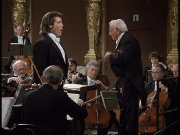
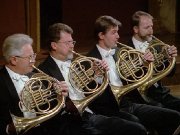
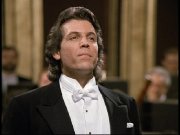
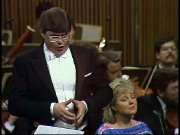
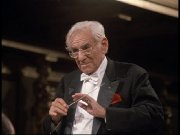

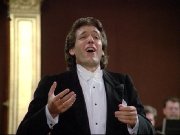

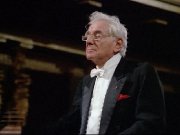






































Your Opinions and Comments
Be the first to post a comment!